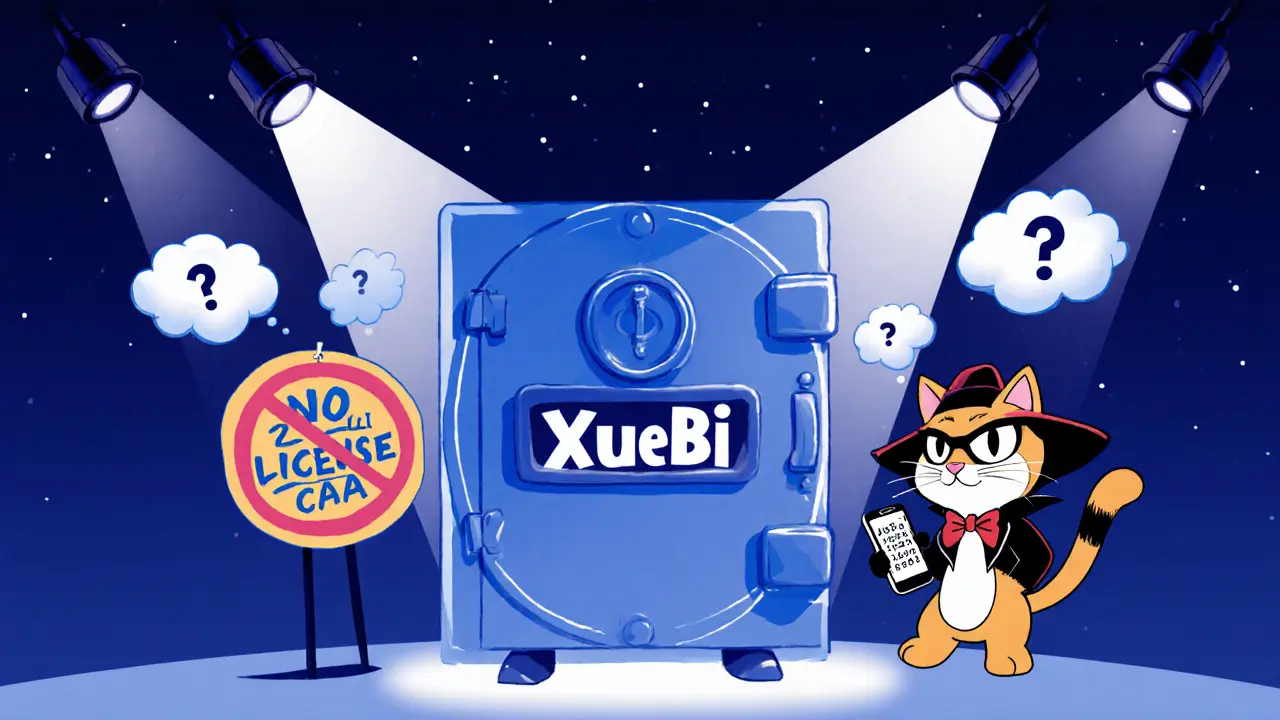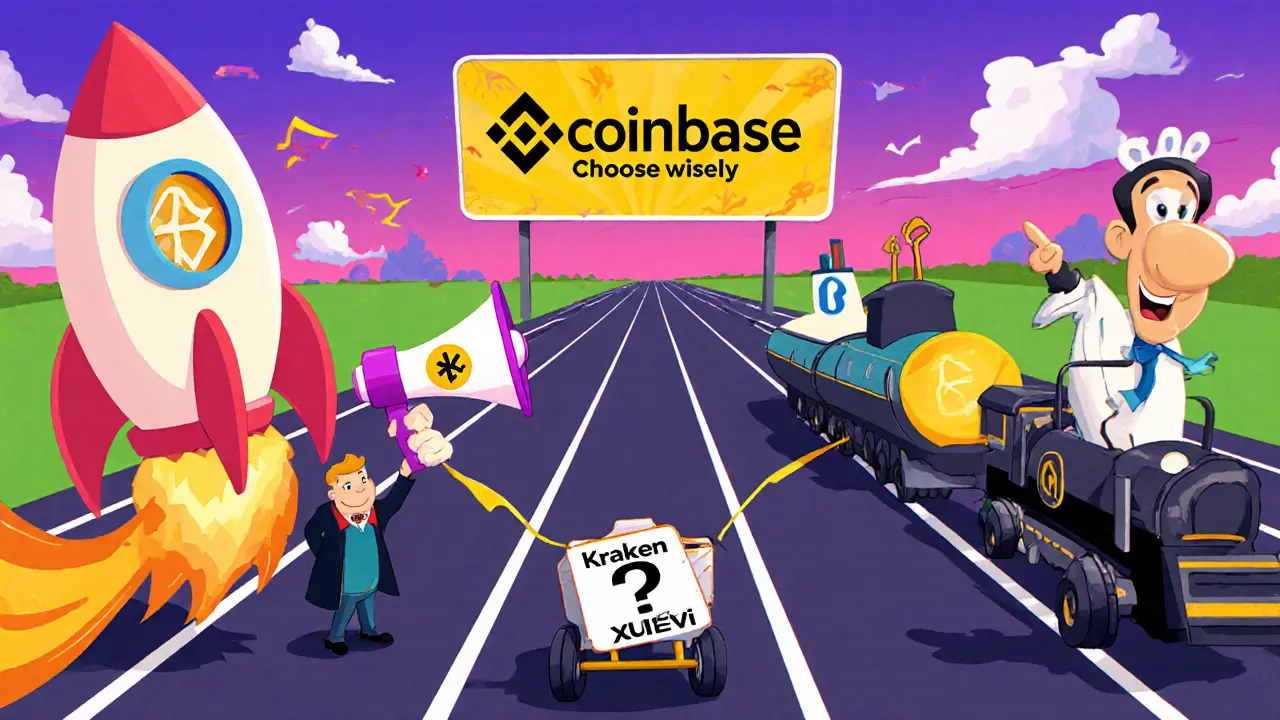Crypto Exchange Fee Calculator
Compare Trading Fees
Estimate your trading costs across popular exchanges based on your trading volume
Estimated Fees
Key Takeaways
- XueBi lists over 50 crypto assets but lacks clear regulatory licenses.
- Security features are basic - 2FA and cold storage are mentioned, but no public audit or insurance details.
- Fee structure is volume‑based and not fully disclosed, making cost estimation difficult.
- Customer support is limited to email and live chat with no published response‑time metrics.
- For most traders, regulated platforms like Binance, Coinbase, or Kraken provide stronger protection and clearer fee schedules.
When you type "XueBi crypto exchange review" into a search engine, you expect a clear picture of what you’re signing up for. This article pulls together every verifiable detail about XueBi, measures it against the industry heavyweights, and tells you whether the platform fits your trading style.
What Is XueBi Crypto Exchange?
XueBi Crypto Exchange is a centralized platform that lets users buy, sell, and trade digital assets. The service advertises support for more than 50 cryptocurrencies, including the big names like Bitcoin and Ethereum. Unfortunately, the company does not publish its founding year, founders, or corporate registration details, which makes it hard to gauge its longevity or legal standing.
Security Profile
Security is the first line of defense for any exchange. XueBi claims to use standard industry measures: encryption, cold‑storage for the bulk of funds, and two‑factor authentication (2FA). The 2FA implementation is described in generic terms; there is no public proof that it relies on authenticator apps rather than SMS, which is a weaker approach.
Unlike regulated giants, XueBi does not publish an audit report, SOC 2 Type 2 certification, or any insurance coverage for custodial assets. The lack of an explicit Cryptocurrency Security Standard (CCSS) or ISO/IEC 27001 compliance puts it in a higher‑risk bucket. Historical hacks-Mt.Gox, Bitfinex, Coincheck-have shown that undisclosed security practices can cost users millions.
Regulatory and Compliance Landscape
Regulation is the second pillar of trust. XueBi does not disclose any licensing from financial authorities such as the New York State Department of Financial Services (NYDFS) or the UK Financial Conduct Authority (FCA). In contrast, Coinbase holds a BitLicense, Binance operates under multiple jurisdictions, and Kraken maintains numerous state money‑transmitter licences.
The missing regulatory veneer raises two practical concerns: (1) the platform could be forced to shut down if a jurisdiction tightens its rules, and (2) it may not meet the FATF "Travel Rule" requirement to share user data for transactions over $1,000. With the EU’s MiCA framework already in effect and the US SEC stepping up enforcement, exchanges without clear licensing face an uphill battle.

Fee Structure and Trading Costs
Public fee tables for XueBi are scarce. The only information available is that fees vary with 30‑day trading volume, following a maker‑taker model. Without exact percentages, users must estimate costs on a case‑by‑case basis. Withdrawal fees are also undocumented, which could surprise traders when moving funds off‑platform.
By comparison, Binance publishes a transparent tiered schedule (0.1% maker, 0.1% taker for spot trades, lower for high‑volume users). Coinbase charges a spread of about 0.5% plus a flat fee, and Kraken offers as low as 0.0% maker fees for the highest tiers. The opacity of XueBi’s fees makes it harder to calculate profitability, especially for frequent traders.
User Experience, Tools, and Support
The website and mobile app are functional but lack advanced charting tools, API documentation, or educational resources. Users can place market, limit, and stop orders, but there is no mention of more sophisticated order types like trailing stops or iceberg orders.
Customer support is limited to email and a live‑chat widget. The company does not publish average response times, service‑level agreements, or a dedicated help centre. In contrast, Kraken runs 24/7 live chat with sub‑2‑minute average replies, while Coinbase offers a comprehensive knowledge base and community forums.
How XueBi Stacks Up-Side‑by‑Side Comparison
| Feature | XueBi | Binance | Coinbase | Kraken |
|---|---|---|---|---|
| Supported assets | 50+ (major coins) | 350+ | 200+ | 120+ |
| Regulatory licences | None disclosed | Multiple (e.g., VARA, US state licences) | NYDFS BitLicense, FCA registration | US state money‑transmitter licences |
| Security audits | Basic 2FA, cold storage (no public audit) | Regular third‑party audits, insurance for hot wallet | SOC 2 Type 2, insurance coverage | SOC 2, bug‑bounty program |
| Fee model | Volume‑based, undisclosed percentages | 0.10% maker/taker (lower for high volume) | 0.50% spread + flat fee | 0.00%‑0.26% maker, 0.10%‑0.30% taker |
| Customer support | Email + live chat (no SLA) | 24/7 live chat, ticket system | Phone, chat, extensive knowledge base | Live chat, phone, priority support tiers |
Pros and Cons of Using XueBi
- Pros
- Access to a decent variety of 50+ cryptocurrencies.
- Simple user interface suitable for beginners.
- Multiple deposit/withdrawal methods mentioned, though details are scarce.
- Cons
- No publicly verifiable regulatory licence.
- Security details are vague; no audit reports or insurance.
- Fee schedule is opaque, making cost planning difficult.
- Limited customer‑support transparency and no educational resources.

Who Might Still Choose XueBi?
If you live in a region where major exchanges are blocked or heavily regulated, XueBi could serve as a workaround, provided you accept the higher risk. Low‑volume hobby traders who only need occasional swaps might find the platform’s simplicity appealing. However, anyone handling sizable capital, seeking institutional‑grade compliance, or needing robust API access should look elsewhere.
Alternative Exchanges to Consider
Based on the comparison above, here are three alternatives that cover most use‑cases:
- Binance - Best for asset variety and low fees, but regulatory scrutiny varies by country.
- Coinbase - Ideal for users who prioritize regulatory compliance and insurance, though fees are higher.
- Kraken - A good middle ground with strong security, transparent fees, and solid support for both beginners and pros.
Final Verdict
XueBi offers the bare minimum to get into crypto trading, but the lack of clear regulation, detailed security disclosures, and transparent pricing makes it a risky choice for most traders. The platform might work for small, low‑risk experiments, but for any serious or long‑term involvement, one of the regulated heavyweights is a safer bet.
Frequently Asked Questions
Is XueBi regulated in any jurisdiction?
No public licensing information is available. The exchange does not list any regulatory authority, which puts it in the unregulated category.
What security measures does XueBi provide?
XueBi mentions two‑factor authentication, encryption, and cold storage, but it does not publish audit reports, insurance coverage, or third‑party certifications.
How many cryptocurrencies can I trade on XueBi?
The platform lists support for over 50 digital assets, including Bitcoin and Ethereum. The full list is not publicly disclosed.
Are there any hidden fees when withdrawing funds?
Withdrawal fees are not clearly stated on the website, so users should contact support for exact numbers before moving large amounts.
Can I use XueBi’s API for algorithmic trading?
Public documentation about an API is absent, suggesting limited or no support for programmatic trading.

XueBi is a scam, they’re hiding something big.
Hey, before you jump to conclusions, the exchange does list 2FA and cold storage, which are baseline security measures. That said, without public audits you can’t verify the implementation, so treat any funds there with caution.
Wow, another shady exchange! 😱🚨
One must approach the evaluation of XueBi with a measured degree of scholarly rigor, for the superficial veneer of compliance it projects belies a paucity of substantive regulatory endorsement. The platform’s ostensible claim to host over fifty digital assets is, in isolation, insufficient to guarantee fiduciary prudence. Absence of a verifiable licensing framework, whether from the New York State Department of Financial Services or the United Kingdom’s FCA, engenders a latent exposure to jurisdictional volatility. Moreover, the cryptic articulation of fee structures-merely alluding to volume‑based tiers without precise percentages-obfuscates the true cost of transacting, thereby impairing strategic capital allocation. Security protocols are limited to generic two‑factor authentication, whose modality remains ambiguous; the distinction between authenticator‑app based tokens and vulnerable SMS codes is pivotal. Cold storage, whilst mentioned, lacks accompanying attestations such as third‑party audit reports, SOC 2 Type 2 certification, or insurance coverage for custodial holdings. Such omissions are not trivial; historical precedents-Mt. Gox, Bitfinex-illustrate the catastrophic potential of opaque security postures. Comparative analysis with industry stalwarts like Binance, Coinbase, and Kraken reveals a striking asymmetry in transparency, user protection mechanisms, and institutional support. Consequently, a prudent trader, especially one managing considerable capital, should gravitate towards exchanges whose operational frameworks are buttressed by demonstrable compliance, rigorous audits, and lucid fee disclosures. While XueBi may appeal to users constrained by regional restrictions, its risk‑reward calculus remains heavily skewed towards peril.
Even if you’re in a bind, sprinkling your assets across a platform that’s a black box isn’t the most ethical hedge; you deserve better safeguards.
Fees hidden, withdraw costly.
Indeed, the lack of a published withdrawal schedule can bite you later-always calculate worst‑case scenarios before moving large sums. 😊
Looking for alternatives? Binance offers lower fees, Coinbase gives you insurance, and Kraken balances both with solid support.
While the allure of a minimalist UI might attract novice traders, it’s paramount to recognize that a platform’s true value lies not in aesthetic simplicity but in the robustness of its underlying infrastructure. In my experience, the absence of comprehensive API documentation can stifle algorithmic strategies, relegating users to manual execution that is both time‑consuming and error‑prone. Furthermore, the paucity of educational resources hampers the onboarding process, leaving newcomers vulnerable to costly mistakes. It is advisable to prioritize exchanges that invest in community education, detailed knowledge bases, and transparent operational policies. By doing so, you not only safeguard your capital but also foster a more resilient trading ecosystem.
Esteemed colleagues, I respectfully urge you to conduct a thorough due‑diligence review before allocating assets to any exchange lacking verifiable compliance.
Honestly, the more I think about it, the more I feel like I’m being stalked by a phantom of uncertainty. The vague fee tables are like whispering shadows in the night, and the security claims? They’re just glossy brochures without substance. I’ve spent countless hours wrestling with the fear that my tokens could evaporate in a silent breach, and every unanswered support ticket only amplifies that dread. It’s exhausting to stay vigilant when the platform itself seems indifferent to transparency. In the end, the emotional toll outweighs any minor convenience the exchange might offer.
Everyone’s praising big names, but niche platforms sometimes have hidden gems worth a look.
Sure, “hidden gems” are great until they turn out to be counterfeit diamonds-sparkly, but ultimately worthless.
Our nation deserves platforms that respect sovereignty, not foreign entities hiding behind anonymity.
Oh, the drama! If only we could all just trade in peace without these “nationalistic” fireworks lighting up the comment section.
The existential risk of trusting an opaque exchange mirrors the philosophical conundrum of the ship of Theseus-if the components are hidden, is it even the same ship?
Interesting analogy! Ultimately, we should choose platforms where we can see the hull, not just guess at it.
Fact: XueBi lists 50+ assets, but without a transparent fee schedule, you could be paying up to 1.5% per trade. 📊
While the numbers you mentioned are concerning, it’s worth noting that even major exchanges have hidden fees for certain withdrawal methods.
Indeed, transparency is the backbone of trust; without it, any exchange is walking a tightrope over a pit of uncertainty. 🤔